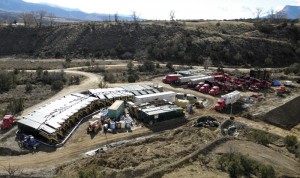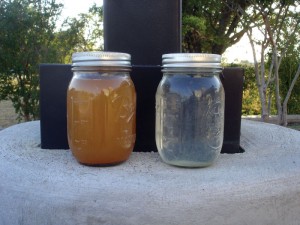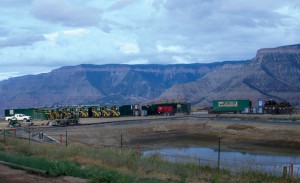ROLCO was featured in Drilling Contractor, “The Water Challenge,” April 24th, 2012. The following is an excerpt from that article.

The Water Challenge
Innovative solutions emerge to address one of hydraulic fracturing’s most critical concerns
By Katie Mazerov, contributing editor

ROLCO’s Flow/Pro 20 electro-coagulation system treats and recycles water on a frac pad in Colorado.
ROLCO Energy Services provides water management solutions for unconventional oil and gas producers using an electro-coagulation process that adds an electric charge to the water to convert dissolved solids such as iron, magnesium, calcium and naturally occurring radioactive materials into suspended solids that can be removed with a mechanical filter.
“By changing the polarity of the water, we are allowing dissolved particles to amalgamate and join together and become a suspended solid,” said CEO and founder Perry Roland. The company, founded in 2009, has worked in the Haynesville shale play and the Piceance Basin to treat water for reuse, and plans on entering the Bakken and Eagle Ford oil plays.
“We have figured out the key to do this successfully in the gas market, but the oil side brings some additional challenges, such as the constituents in the water,” Mr Roland said. “As operators continue to move rigs from the dry gas plays to the oil plays, our technology will follow.”

Raw flowback and produced water prior to treatment by ROLCO’s electro-coagulation system (left) is compared with water that has been through the electro-coagulation process (right), prior to the polishing stage, where all remaining solids are removed for more efficient reuse at the fracturing site.
To that end, ROLCO is partnering with AbTech Industries, which has developed the Smart Sponge, an oil-absorbent material that removes hydrocarbons on the front end of the electro-coagulation process so they don’t enter the clean water system.
“The Smart Sponge is oleophilic, so it absorbs hydrocarbons that are in the water, but it is also hydrophobic, so it repels and doesn’t retain water,” said AbTech chief operating officer Jonathan Thatcher. “We manufacture it in a manner that retains very high flow rates through the media and results in little or no pressure loss. It can absorb one to two times its weight in hydrocarbons.”
The process solidifies the hydrocarbons it removes, creating a solid that can be burned as a fuel source in waste-to-energy facilities, cement kilns or incineration operations, Mr Thatcher explained. The water being treated is a combination of fracturing flowback water and produced water. It can be treated repeatedly, although the process may need to be modified because the water profile will change over time.
AbTech’s portable and installed units can process 10,000 bbls/day to 100,000 bbls/day of produced water. Often, there are multiple units on a fracturing site.

A ROLCO electro-coagulation processing site in Colorado treats and recycles 100% of flowback and processed water from fracturing. Contaminated water is collected in a pit, then pumped into electro-coagulation systems, where it is processed on-site and recycled back to the fracturing process.
After the de-oiling process, a number of different technologies, including electro-coagulation, can be used to treat the water for a variety of uses. “The water can be treated to remove everything except brine for reuse in fracturing operations and can also be treated for discharge, which involves further removal of the salts and chlorides, typically by a reverse osmosis (RO) process for discharge into lakes or rivers. Pre-treatment is always required because other technologies, especially RO, can’t tolerate oil and grease coming into their systems,” Mr Thatcher explained.
Because a well will produce up to five times as much water as oil and gas over its life, some in the industry are eyeing water treatment systems as a potential source of water for agricultural purposes, provided all the salts are removed. “We could have a source of agricultural water that is not going to impact traditional drinking water sources such as lakes, rivers and underground aquifers,” Mr Thatcher said.





